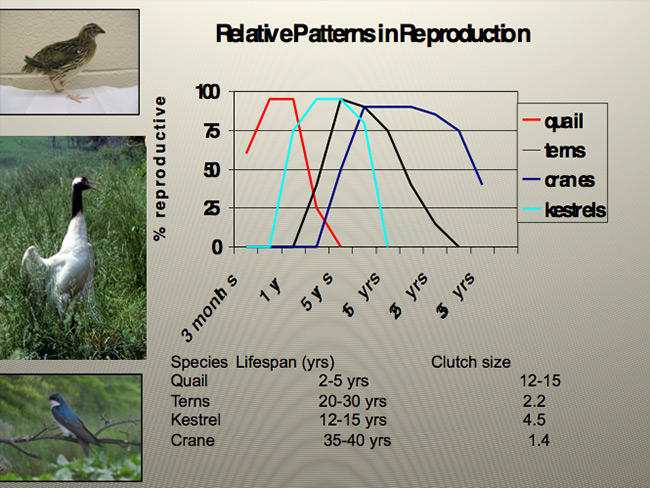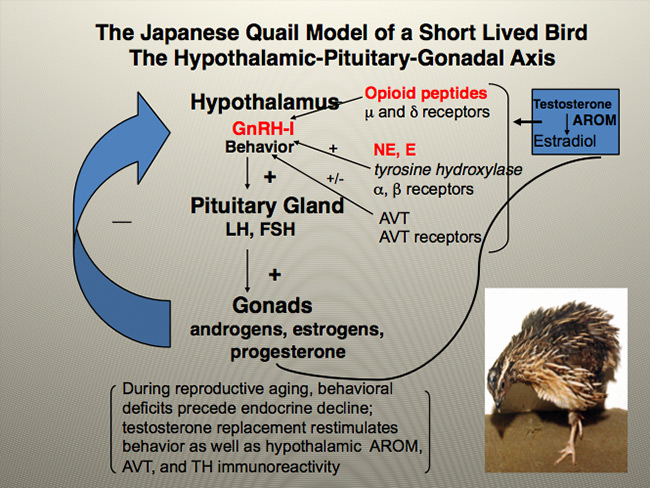Faculty Profile
 Mary Ann Ottinger
Mary Ann Ottinger
Emeritus Professor and Research Professor
Department of Biology and Biochemistry
Research Division: Ecology and Evolution (Primary), Cell and Molecular Biology (Joint/Adjunct)
Office: Science & Research 2, 221E
Contact: maotting@central.uh.edu - (713) 743-8886
Education: Ph.D., University of Maryland
 Dr. Mary Ann Ottinger’s research incorporates interdisciplinary and comparative biology
approaches to understand the impacts of environmental chemicals, specifically endocrine
disruptors (EDCs) on neural systems, behavior and aging. Her studies have utilized
a spectrum of species, ranging from birds to non-human primates, providing expertise
in translational studies across model systems. Studies in birds allowed direct manipulation
of the embryo; adverse effects from EDC exposure occurred in maturing and adult individuals,
impacting reproductive, thyroid, and adrenal endocrine systems and impaired heart
development.
Dr. Mary Ann Ottinger’s research incorporates interdisciplinary and comparative biology
approaches to understand the impacts of environmental chemicals, specifically endocrine
disruptors (EDCs) on neural systems, behavior and aging. Her studies have utilized
a spectrum of species, ranging from birds to non-human primates, providing expertise
in translational studies across model systems. Studies in birds allowed direct manipulation
of the embryo; adverse effects from EDC exposure occurred in maturing and adult individuals,
impacting reproductive, thyroid, and adrenal endocrine systems and impaired heart
development.
 Other studies focused on benefits of calorie restriction on aging in non-human primates,
and studies in transgenic Alzheimer’s disease (AD) mouse models revealed estradiol
treatment ameliorated cognitive and neural decline in AD.
Other studies focused on benefits of calorie restriction on aging in non-human primates,
and studies in transgenic Alzheimer’s disease (AD) mouse models revealed estradiol
treatment ameliorated cognitive and neural decline in AD.
As an administrator, Ottinger continues to utilize an interdisciplinary approach and build teams to address complex research problems facing us at regional, national and global scales. Further, she has facilitated workshops and symposia to engage key stakeholders spanning multiple disciplines, academic institutions, government and industry partners to enhance communication and develop strategic partnerships to advance research initiatives.
- Spann, S.J. and Ottinger M.A (2018). Longevity, metabolic disease and community health. In: Progress in Molecular Biology and Translational Science Metabolic Aspects of Aging. Volume One Hundred and Fifty Five (Ottinger, MA, ed). Academic Press, An imprint of Elsevier, London UK. 2018. pp. 2-10.
- Ottinger, M.A. (2018). A comparative approach to metabolic aspects of aging: conserved mechanisms and effects of calorie restriction and environment. In: Progress in Molecular Biology and Translational Science Metabolic Aspects of Aging. (Ottinger, MA, ed). Academic Press, An imprint of Elsevier, London UK. 2018.
- Carro T, Walker MK, Dean KM, Otttinger MA. (2017). Effects of in ovo exposure to 3,3’4,4’ tetrachlorobiphenyl (PCB 77) on heart development in tree swallow (Tachycineta bicolor). Environmental Toxicology and Chemistry. 37(1): 116-125.
- Dean KM, Baltos LD, Marcell, AM, Bohannon MEB, Iwaniuk AN, Ottinger MA. (2018). Uptake of radiolabeled 3,3’,4,4’-tetrachlorobiphenyl into Japanese quail egg compartments and embryo following air cell and albumen injection. Environmental Toxicology and Chemistry. 37(1): 126-135.
- Tschiffely AE, Schuh RA, Prokai-Tatai K, Ottinger MA, Prokai L. (2018). An exploratory investigation of brain-selective estrogen treatment in males using a mouse model of Alzheimer’s disease. Horm Behav. 98:16-21.
- Ottinger MA, Lavoie ET, Bohannon MEB, Marcel AM, Tschiffely AE, Duffy KB, McKernan M, Tillitt DE, Lipton J, Dean KM. (2018). Embryonic effects of an environmentally relevant PCB mixture in the domestic chicken. Environmental Toxicology Chemistry 2018 Jun 27. Doi: 10.1002/etc.4218. [Epub] PMID: 29947098.
- Bohannon, MEB and Ottinger MA. (2018). Polychlorinated biphenyls: Sources, Fate, Effects on Birds and Mammals, and Mechanisms of Action. In: Reference Module in Earth Systems and Environmental Sciences. Encyclopedia of the Anthropocene. Volume 5. Elsevier Inc., London. Eds. DA DellaSala and MI Goldstein. pp. 207-2132.
- Rowlison T, Ottinger MA, Comizzoli P. (2017). Key factors enhancing sperm fertilizing ability are transferred from the epididymis to the spermatozoa via epididymosomes in the domestic cat model. J Assist Reprod Genet. 35(2): 221-228.
- Lazarus RS, BA Rattner, PC McGowan, RC Hale, NK Karouna-Renier, RA Erickson, MA Ottinger. Chesapeake Bay fish-osprey (Pandion haliaetus) food chain: Evaluation of contaminant exposure and genetic damage. Environ Toxicol Chem. 2016 Jan 28. doi: 10.1002/etc.3386. [Epub ahead of print] PMID: 26822899
- Tschiffely, AE, RA Schuh, K Prokai-Tatrai, L. Prokai, MA Ottinger. (2016). A comparative evaluation of treatments with 17β-estradiol and its brain-selective prodrug in a double-transgenic mouse model of Alzheimer’s disease. Hormones and Behavior 83: 39-44.
- Prosser, DJ, LL Hungerford, RM Erwin, MA Ottinger, JY Takekawa, SH Newman, X Xiao, EC Ellis. (2016). Spatial modeling of wild bird risk factors for highly pathogenic A(H5N1) avian influenza virus transmission. Avian Diseases 60 (1): 329-236.
- Dean, KD, L Baltos, T Carro, A Iwaniuk, MB Bohannon, MA Ottinger (2016). Comparison of vehicle mortality following in ovo exposure of Japanese quail (Coturnix japonica) eggs to corn oil, triolein and a fatty acid mix. Endocrine Disruptors Doi e1224022; published online 22 Aug 2016; vol 4.
- DeCaluwe, HB, NC Wielebnowski, J Howard, KM Pelican, MA Ottinger (2016). Characterization of multiple pathways modulating aggression in the male clouded leopard (Neofelis nebulosa). Zoo Biology Sept 2. Doi 10.1002/zoo.21319. [Epub ahead of print]
- Rowlison, T, MA Ottinger, P Comizzoli (2016). Deciphering the mechanisms involving cenexin, ninein and centriolin in sperm maturiation during epididymal transit in the domestic cat. Reprod. Domest. Anim. Nov 3 doi: 10.1111/rda.12831 [Epub ahead of print].
- Lazarus, RS, BA Rattner, BW Brooks, B Du, PC McGowan, VS Blazer, MA Ottinger. (2015). Exposure and food web transfer of pharmaceuticals in ospreys (Pandion haliaetus): Predictive model. Integrated Environmental Assessment and Management. Epub 2015 Jun 24.PMID: 26114899.
- Ellison, PT and MA Ottinger (2014). A Comparative Perspective on Reproductive Aging, Reproductive Cessation, Post-Reproductive Life, and Social Behavior. In Sociality, Hirarchy, Health Comparative Biodemography. NAS Press. Eds. M Weinstein and MA Lane. pp. 315-338.
- Carro, T, LA Taneyhill, and MA Ottinger. (2013). The effects of an environmentally relevant 58 congener polychlorinated biphenyl (PCB) mixture on cardiac development in the chick embryo. ET&C 32: 1327-1324.
- Ottinger, MA, T Carro, M Bohannon, L Baltos, AM Marcell, M McKernan, E Lavoie, and MA Abdelnabi. (2013). Assessing effects of environmental chemicals on neuroendocrine systems: potential mechanisms and functional outcomes. Gen. Comp. Endocrinol., 190: 194-202.
- Aitken-Palmer, C, R Hou, C Burrell, Z Ahang, C Wang, R Spindler, DE Wildt, MA Ottinger, and J Howard. (2012). Protracted reproductive seasonality in the male giant panda (Ailuropoda melanoleuca) reflected by patterns in androgen profiles, ejaculate characteristics, selected behaviors. Biology Reprod. 86(6): 195-201.
- Ottinger, MA, Dean, K. (2011). Neuroendocrine impacts of endocrine disrupting chemicals in birds: Life stage and species sensitivities. J. Toxicol. Environ. Health, Part B Crit. Rev. 14(5-7): 413-422.
- Ottinger, MA, Mobarak, M, Abdelnabi, MA, Roth, G, Proudman, JA, Ingram, DK (2005). Effects of caloric restriction on reproductive and adrenal systems in Japanese quail: Are responses similar to mammals, particularly primates? Mechanisms of Ageing and Development 126(9):967-975.
- Roth, GS, JA Mattison, MA Ottinger, Chachich, ME, Lane, MA, Ingram, DK (2004). Rhesus monkeys: Relevance to human health interventions. Science 305:1423-1426.
Honors and Awards
2014: Fellow, American Association for the Advancement of Science
2012: Leadership Fellow, Advance Program, University of Maryland, College Park
2012: Fellow, Society for the Study of Reproduction
2011-2012: Advance Professor, University of Maryland, College Park
2011: Gordon Cairns Award, College of Agriculture and Natural Resources, University
of Maryland
2011: Award for Service, Division of Research, University of Maryland
2005: Gamma Sigma Delta (National Capitol Area Chapter) Research Award of Merit
2003-2004: Peer Review Panel and Public Hearing for the EPA Ecological Risk Assessment
for the Housatonic River Area; January 2004.
2003: Outstanding Service Award, Eleanor Roosevelt High School Science and Math Technology
Program for Mentoring Students for their Research Practicum and Internships.
2002: Certificate of Teaching Excellence, Undergraduate Studies, University of Maryland,
College Park
Organizations, Outreach, Boards, Memberships
Editorial Boards: General and Comparative Endocrinology (1994-2001); Experimental Biology and Medicine (1999-2005); Environmental Toxicology/Chemistry (2005-2011); AGE (2004-present); Biology of Reproduction (2009-2014), Avian Biology Research (co-editor 2008-2014)
Member, OECD Working Group on Avian Reproductive Toxicity Testing (1997-2005)
Steering Committee and Member, Chesapeake Bay Programs Goal Implementation Team (GIT) for Habitat Restoration (2005-2014): Co-author: Toxic Contaminants Report Action Committee – white paper in response to the Executive Order 13508: Chesapeake Bay Protection and Restoration
Steering Committee (2013-14) on Advances in Biodemography: Cross-Species Comparisons of Social Environments, Social Behaviors, and Their Effects on Health and Longevity and Workshop in 2014
Representative, Southeastern Universities Research Association Coastal Ecosystems Research Committee (2011-present)
UH Collaborations on Studies of Gulf of Mexico Ecosystem within Texas; Serve on the Texas Center of Excellence TONE Committee (2015-present)
Member, Agriculture, Food and Renewable Resources (Section O) and the Biology Section. (2011-present)